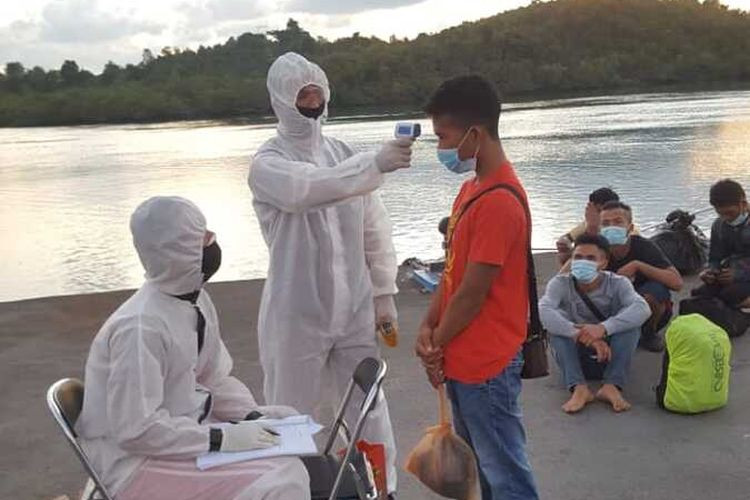ASEAN, migrant workers and the COVID-19 crisis
Because of their mobility, too, migrant workers are prone to stigmatization as carriers of the virus that causes COVID-19.
Change Size

This weekend ASEAN will hold a high-level conference that will be participated by all heads of government from the 10 ASEAN member countries, with focus likely to be given to concerted efforts to handle the COVID-19 pandemic.
The leaders had previously met online for a special high-level conference related to COVID-19 on April 14 and produced the Declaration of the Special ASEAN Summit on Coronavirus Disease 2019 (COVID-19). From the critical reading of Migrant CARE, this declaration is very normative and does not address the crucial issues regarding the COVID-19 outbreak and its impact on the vulnerable communities in the region, especially migrant workers.
The declaration focuses more on medical governance and information exchange during the COVID-19 pandemic. While those issues are definitely important, ignorance of the non-health aspects of the pandemic only demonstrates how stuttering and sluggish ASEAN has been in dealing with the health crisis.
The declaration, too, fails to address human mobility, which has significantly contributed to the economy of the region. Both sending and receiving countries reap benefits from labor migration with the volume of their remittances, commodity exports and labor supply for infrastructure projects.
Because COVID-19 knows no national borders, cooperation among countries, especially in the regional framework, is a must. But the declaration is just rhetoric given the fact that in the context of the protection of migrant workers, ASEAN is divided over the interests of receiving and sending countries.
Migrant workers are one of the most affected groups by this pandemic. Those who work in the care, health and public services sectors are vulnerable to direct disease transmission. Because of their mobility, too, migrant workers are prone to stigmatization as carriers of the virus that causes COVID-19.
Meanwhile, as foreign citizens, migrant workers are susceptible to discrimination in health and other public services in their placement countries. Undocumented migrant workers, usually in Malaysia and Thailand, are particularly vulnerable, as they have to face the threat of losing their jobs and arrest by immigration authorities.
International bodies under the United Nations have confirmed that migrant workers are among the most vulnerable groups in this time of global crisis. The International Labor Organization places migrant workers as the most affected group along with informal sector workers and unemployed young people.
UN Women has expressed concern about the vulnerability of women migrant workers in the care and health sectors because they are exposed to the virus on a daily basis. Meanwhile, the workload of migrant domestic workers, mostly women, is increasing, and they are more prone to physical and sexual violence due to their limited mobility.
Economically, the World Bank forecasts a decrease in remittances from labor migration this year. This contraction will trigger an escalation of poverty. Separately, the United Nations Development Program underlined in its COVID-19 and Human Development Index report that reduction in the volume of remittances would lower the quality of human life and widen inequality.
The vulnerability of migrant workers, especially undocumented ones, was evident in Malaysia when the government implemented the Movement Control Order. Millions of migrant workers had to survive on limited food supplies, while facing job uncertainty.
The repressive immigration policy remains in place, although the World Health Organization has issued a protocol for COVID-19 handling that prioritizes the provision of health care without discrimination.
Instead of containing the virus, the security approach targeting migrant workers has produced new clusters of COVID-19 transmission in several Malaysian immigration prisons.
UN human rights officials and various human rights groups have condemned Malaysia for its continued crackdown on undocumented migrant workers and for denying entry to Rohingya refugees.
Unlike Malaysia, Singapore, another migrant worker receiving country, took steps to protect migrant workers. Initially, Singapore did not care about the migrants’ vulnerability until there was an explosion of cases in migrant worker settlement areas, leading to a second wave of the outbreak in April.
To overcome this situation, the Singaporean government restructured migrant worker residential areas by implementing protocols and conducting rapid tests on tens of thousands of migrant workers to trace the chain of contagion and cut its transmission routes.
Human rights protection is one of the principles of ASEAN reform. This commitment to human rights can be seen in the adoption of human rights principles, though not yet comprehensively, in the ASEAN Charter.
The elaboration of human rights principles is also institutionalized in a variety of mechanisms, such as the ASEAN Intergovernmental Commission on Human Rights, the ASEAN Commission on Women and Children and the ASEAN Commission on Migrant Workers, as well as legal instruments, such as the ASEAN Declaration on the Promotion and Protection of the Rights of Migrant Workers, the ASEAN Consensus on the Protection and Promotion of the Rights of Migrant Workers and the ASEAN Convention Against Trafficking in Persons.
Ironically, although a set of human rights protection mechanisms and instruments, especially for migrant workers, is already in place in the ASEAN framework, there is yet to be an official ASEAN mechanism to address the vulnerability of migrant workers to the health crisis.
When meeting at this weekend’s summit, the ASEAN leaders should end this ignorance and formulate actions to protect the millions of migrant workers employed across the region. There must be a strong impetus for ASEAN to develop a COVID-19 handling protocol based on the protection of the human rights of migrant workers and refugees in ASEAN.
***
The writer is executive director of Migrant CARE.









